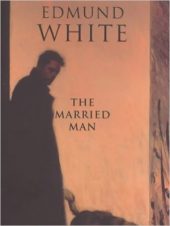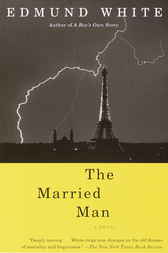 The Married Man
The Married Man
by Edmund White
Published by Alfred A. Knopf
Published 2000
Fiction (autofiction)
310 pgs. • Find on Amazon.com
Reviewed by Stephen O. Murray
July 30, 2000
I have been slogging through Edmund White’s The Married Man. Living in an AIDS epicenter, and having witnessed the fading and final extinction of close friends who were in their 30s, I am not at all eager to read about young men dying slow, agonizing AIDS deaths. I have a number of such books but have read hardly any of them. The major reason that I read The Married Man is that the French lover (based on Hubert Sorin) is so intriguingly a void—ever-lurking but not written about— in White’s previous “novel,” The Farewell Symphony.

Paperback edition, 2000
I am sure that it is very, very difficult to write with any objectivity about someone whom one has loved intensely and nursed through an agonizing death at a young age. Not to sentimentalize someone lost like this would seem positively inhuman, so one cannot expect so autobiographical a novel to avoid sentimentalizing the fallen friend. Not that the character Julien. whom White portrays. is not all sweetness and light. Indeed, he is exceptionally demanding and more than a little vainglorious. The reader can understand what makes him seem glamorous to an American living in Paris.
If White had written a memoir, fictional or not, the limited extent to which he was able to figure out what made his beloved act the way he did would be unexceptionable. However, The Married Man is not written in the first person, and the third-person narrator only has insights into Austin, the expatriate American, and Austin’s perspectives about other people. It seems to me that if Julien is going to remain inscrutable, Austin should narrate the story. If the narration is going to be third person objective, the characters should be equally transparent. That is, if it is not Austin’s version, the omniscient narrator should clue the reader in to what Julien thinks he is doing and why he is doing what he does as much as the narrator delves into Austin’s subjectivity. “Who knew, would ever know, what Julien was feeling inside?” (p. 214) is, rightly enough, a puzzle to Austin, but should not be to a narrator who is not in the book.
Another major technical problem with the novel is the excessive amount of explaining in it, especially explaining fairly stereotypical Latin/Anglo differences (the French/American ones are often at that higher level of abstraction). White does not seem to trust that the reader can draw conclusions if he shows us differences without telling us what the differences in expectations are and assigning them all to national/cultural differences. Although the dates of the narrative are vague, is it necessary to note that the channel wasn’t yet open? (More central is that the whole takes place before the protease revolution.) Like Austin, White is an “amateur sociologist” (in contrast to Julien, “a romantic individualist” (p. 92)). Perhaps, we should be grateful that so analytic a writer does not try to explain love, but contents himself with celebrating its mysteries?
I find the abjectness of Austin wearing, as I did of White’s alter ego in The Farewell Symphony. A degree of self-deprecation for someone who in many ways is living a charmed life is seemly, but White goes far beyond self-deprecation to what seems to be old-fashioned homosexual self-hatred. The reader—at least this reader—admires the commitment Austin maintains not only to his dying lover (even though they were together only a few months before Julien’s health problems begin) but also to an ex-lover (Peter, who is also very demanding but without supplying any glamour or intelligence or grace…). This is no monster of carnality and selfishness! To me, Austin is insufficiently selfish, insufficiently angry, and far too guilt-ridden.
Moreover, the sexual relationship between Austin and Julien does not ring true to me. In general, why two people who love each other cease having sex is almost as mysterious as why two people fall in love. Austin decides to withhold sex from Julien because of Julien’s contempt for Peter. I find this incredible, especially since Austin knows that Julien will interpret and accept this as revulsion for his disease and waning good looks. It is all too credible that they would never discuss the matter, but the intentional (and, to me, very gratuitous) cruelty of this is one of the most horrifying parts of this horror story.
Although there are many aspects about this book that make me very uncomfortable and/or frustrated, I kept turning the pages. Almost every page has some well-expressed keen observation of a character or a place. The number of places is considerable. The main location is Paris, but there are comedies of errors in Providence, Rhode Island; visits to Nice, Cancun, Key West, and Disney World; and a death-defying final trip around Morocco.
And there are many secondary characters, most of whom drop from sight after appearing in one chapter but who provide some entertainment (to the reader, if not always to Austin and Julien) while they are around.
There are many pleasures of and in the text, even though it is the horror story of a fairly heroic young man dying agonizingly. Often funny, it is definitely not light reading!
Somewhat oddly, this book is less elegiac than White’s previous book, or his far tighter masterpiece Nocturnes for the King of Naples (a récit written before White lived in France, in contrast to his recent shapeless, episodic romans fleuves).
Published on epinions 30 July 2000
©2000, 2016, Stephen O. Murray

